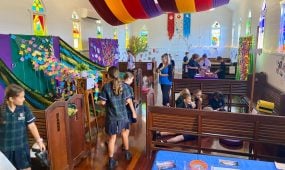Challenging violence of every kind
Features
“Jesus calls us into life in all its abundance, which includes the fundamental right to be safe – as Anglicans we are committed to transforming unjust structures of society and challenging violence of every kind, which necessitates actively contesting social norms that foster inequality and associated violence,” says Domestic and Family Violence Working Group member The Rev’d Gillian Moses

This day, we pray against your absence, silence and hiddenness.
Come with full power into deathly places
And we will praise you deep and full. Amen (Walter Brueggemann)
I write this reflection on Ash Wednesday, when images of God’s refining fire are foremost in my mind. Historically, the palm crosses from the previous year’s Palm Sunday are burned to create ashes for Ash Wednesday, and this symbolises the burning away of all that is unhelpful or damaging in our lives to make space for God’s grace to enter in.
Yet there is nothing that can be called ‘refining’ in the flames that burned on a quiet suburban street in Camp Hill on Wednesday 19 February.
It is easy to reflect on, and pray to, the God of love, who calls us to love one another more fully, and to know ourselves as fully loved. It is easy to assure others that God loves them, that they are ok. But what does our faith say to the family of Hannah Clarke and her three young children who died on that quiet suburban street, and also to the family of the father? Which God will speak into that space? Or does God seem absent, silent and hidden, as Brueggemann’s prayer suggests?
Ash Wednesday marks the beginning of Lent, and the path through Lent draws us into an experience of exile and isolation. The Lenten readings track Jesus’ steps along this path – his wilderness experience, the setting of his face towards his trial and death, and his urgent teaching to his disciples on love, resurrection and hope, even as he faces persecution, death and despair. We travel that path to Good Friday, and even though we know that Easter is coming, we peer with Jesus into the depths of hopelessness.
Advertisement
Lent reminds us that, although we know the truth of Easter, we cannot shortcut Christ’s suffering on Good Friday. And, perhaps, that is part of what God speaks to us about in times of grief and bewilderment. We walk with a God who understands physical abuse, torture, abandonment and death, and the despair that must surely accompany those experiences. We must not hurry past the smoking car, in denial because of shock or conveniently distracted by happier posts in our news feeds. We are called back to the scene of these tragic murders to acknowledge just what has happened there and to carefully consider our response.
Our faith does not just tell the story of death and resurrection. At times like this we also cry out for a God who will not let this violence happen! The Jesus story also speaks of the intrinsic value of human beings – the equality of men and women – and insists that nobody deserves to be on the receiving end of violence, especially from an intimate partner or family member. Jesus calls us into life in all its abundance, which includes the fundamental right to be safe – as Anglicans we are committed to transforming unjust structures of society and challenging violence of every kind, which necessitates actively contesting social norms that foster inequality and associated violence.
Advertisement
The Anglican Church Southern Queensland’s Domestic and Family Violence Working Group is developing more resources and delivering training to members of our Diocese who experience or encounter domestic and family violence. We are pleased to endorse the Joint Churches Domestic Violence Prevention Project workshops listed below. The more we do to transform destructive and unhealthy beliefs and behaviours, the more we help to bring about abundant life for all human beings. This is an essential aspect of our discipleship with Jesus. It is how we make God’s presence known and heard.
The ashes of Ash Wednesday, the Lenten season, and the crucifixion eventually give birth to new and abundant life. My hope is that the ashes in that quiet suburban street might induce a renewed commitment by all Anglicans to support families experiencing violence and to address the causes of family violence in practical and meaningful ways.
I hope our response, and that of the wider community, gives birth to a sense of peace for the family of Hannah Clarke and her three children, as they grieve their deaths. I also hope such responses give birth to peace for the family members of the perpetrator, as they cope with their own profound grief.
I hope that the God, who seems silent or absent at these moments, may still reveal Godself in the deathly places. For this to happen, we must bear Christ in our response.
Joint Churches Domestic Violence Prevention Project Workshop Dates
16 May Toowoomba
July Brisbane Westside of Christ (precise date to be confirmed)
12 September Gold Coast
For more workshop information, contact the Queensland Churches Together office on 07 3369 6792 or via admin@qct.org.au
The following Domestic and Family Violence support services are available:
1800 RESPECT National Helpline: 1800 737 732
Domestic Violence Helpline (including for emergencies): 1800 811 811
Men’s Referral Service: 1300 766 491
Lifeline Australia (24-hour crisis line): 131 114





